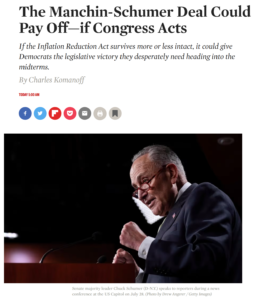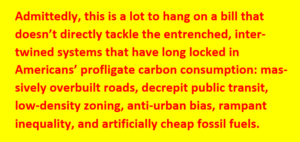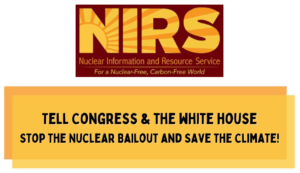[Our new page, The Inflation Reduction Act of 2022, has much more on the legislation spawned by the Manchin-Schumer deal — what it will and won’t do to emissions, what it means for climate policy, and whether it closes or opens future paths for carbon pricing. — Sept. 1, 2022]

To access this post’s original version in “The Nation,” use link at top of text.
The Nation magazine this morning published my essay, The Manchin-Schumer Deal Could Pay Off—If Congress Acts. I’ve cross-posted it here to allow comments and add graphics for context.
While the deal assiduously, and regrettably, leaves intact the deep, intertwined roots of U.S. fossil fuel dependence, it’s imperative to support it — not just for its beneficial, albeit indirect, impacts on emissions, but because of its potential to materially improve both climate dynamics and political dynamics in the U.S.
Our Comments are open. Let us know what you think.
— C.K., August 2, 2022
The Inflation Reduction Act of 2022 will knock out less than 10 percent of U.S. climate pollution by 2030, leaving the nation short of even its whittled-down goal of getting emissions 40 percent below the 2005 level.
Why, then, are many climate activists popping champagne corks? And why should progressives of every stripe do likewise? It’s simple. If the deal between Senate Majority Leader Chuck Schumer and West Virginia Senator Joe Manchin survives more or less intact, it will upend two deeply debilitating narratives: U.S. climate helplessness and Biden-Democratic Party haplessness.
The haplessness first: The legislation should help dispel the aura of fractious Democrats incapable of doing what we elect them to do: deliver big structural change. This turnabout could boost the Dems’ chances of retaining or even expanding control of Congress in the midterms, making possible not just other climate wins but also gains on voting and reproductive rights, economic justice, and the rest of the progressive agenda we hold dear.
 The Inflation Reduction Act likewise marks a turning point, at least for the time being, on long-running, world-damaging U.S. climate helplessness. True, modeling by the Rhodium Group found that the legislation will only deliver a 7 to 9 percent carbon reduction relative to ongoing trends—far short of the massive cuts required for the United States to credibly claim global climate leadership. But by letting millions more Americans experience wind, solar, and energy efficiency—not as abstractions but as palpable engines of economic advancement—the bill opens paths to expansive climate gains going forward.
The Inflation Reduction Act likewise marks a turning point, at least for the time being, on long-running, world-damaging U.S. climate helplessness. True, modeling by the Rhodium Group found that the legislation will only deliver a 7 to 9 percent carbon reduction relative to ongoing trends—far short of the massive cuts required for the United States to credibly claim global climate leadership. But by letting millions more Americans experience wind, solar, and energy efficiency—not as abstractions but as palpable engines of economic advancement—the bill opens paths to expansive climate gains going forward.
The omnibus legislation also burnishes green energy investments by packaging them with other popular but less threatening reforms such as affordable prescription drugs and higher taxes on big corporations. Not to mention the chef’s kiss of the bill’s name, the Inflation Reduction Act, signaling Democrats’ attentiveness to this year’s hot-button issue.
Admittedly, this is a lot to hang on a bill that doesn’t directly tackle the entrenched, intertwined systems that have long locked in Americans’ profligate carbon consumption: massively overbuilt roads, decrepit public transit, low-density zoning, anti-urban bias, rampant inequality, and artificially cheap fossil fuels. But, to borrow from Auden, such are our low, dishonest politics. No bill addressing even one of those matters was ever going to pass this Congress, with the modest exception of a fee on “excess” methane leaks from oil and gas wells and pipelines, starting in 2024.

A mailing from the antinuke Nuclear Information & Resource Service proclaims the legislation’s reactor-preservation provisions “will fail to reduce greenhouse gas emissions by any amount.” Really? The recent shutdown of New York’s Indian Point reactors has increased statewide CO2 emissions by a whopping 8 million metric tons a year.
Instead, we get three big, complementary though indirect ways to cut emissions: monetary rewards for wind, solar, and nuclear—yes, nuclear—generators that make electricity without burning fossil fuels; bigger tax credits to purchase electric automobiles and accelerate the demise of fossil cars and trucks; and tax breaks for US factories to manufacture those new wind turbines and solar arrays.
If much of that sounds technical, wait till you hear Rhodium explain that the Inflation Reduction Act will let clean-energy developers transfer their tax credits to third parties that “have tax liability and [thus] the ability to monetize the credits.” The 700-page bill abounds with just such tools to crack open long-standing bottlenecks impeding the shift to clean energy.
The legislation also swarms with fossil-fuel concessions, most notably a requirement that the Interior Department auction off more public lands and waters for oil drilling. The Center for Biological Diversity last week labeled that provision a “climate suicide pact … that will fan the flames of the climate disasters torching our country [and deliver] a slap in the face to the communities fighting to protect themselves from filthy fossil fuels.”
Fossil fuel extraction and processing are indeed filthy and toxic. But expanding U.S. leasing will worsen total warming only slightly. Since fuels are fungible, stopping one carbon source leads Big Oil to tap supply somewhere else. Rather, by cutting overall demand for fossil fuels, the Inflation Reduction Act “will make oil leasing less profitable and therefore less widespread,” as UC Santa Barbara environmental politics professor Leah Stokes noted last Friday on Democracy Now. Fewer communities overall will be ravaged by drilling, let alone floods and other climate havoc.
People complaining about the provision in the #InflationReductionAct that allows for more drilling on federal lands have a VERY different counterfactual than I do. It would almost be like me complaining there is no carbon tax in the bill…#ClimateCrisis #ClimateAction
— Christopher Knittel (@KnittelMIT) July 29, 2022
Let’s also credit the Manchin-Schumer deal’s potential to leverage U.S. emission cuts by palliating our global climate disrepute, a point long made by Senator Edward J. Markey (D-MA), who along with Rep. Alexandria Ocasio-Cortez (D-NY) and the Sunrise Movement, is widely credited with elevating the Green New Deal into political discourse. “You can’t preach temperance from a bar stool,” Markey said in 2008, adding last week that “you can’t ask China, India, Brazil or other countries to cut emissions if we’re not doing it ourselves in a significant way.”
While we shouldn’t over-credit the immediate carbon reductions from the Inflation Reduction Act, it’s imperative to close ranks behind it, as MIT climate economist Christopher Knittel urged on Twitter last week: “People complaining about the provision in the Inflation Reduction Act that allows for more drilling on federal lands have a very different counterfactual than I do. It would almost be like me complaining there is no carbon tax in the bill.”
Knittel’s counterfactual, of course, was U.S. climate stasis. Mine was as well, along with Democratic Party squabbling. That may have changed last week. We must make the most of it.
Charles Komanoff, a longtime environmental activist, directs the Carbon Tax Center.
Addendum: The Inflation Reduction Act includes a fee on “excess” methane emissions from oil and gas wells and pipelines of $900 per metric ton of emissions above new federal limits in 2024, increasing to $1,500 per metric ton in 2026. MIT economist Chris Knittel (quoted above) equates the $900 methane fee to $60 per metric ton of CO2, a level that would qualify as a fairly robust nose in the proverbial camel’s tent of carbon pricing.

JP Partland says
Yes! Something is better than nothing. I hope it passes.
At the same time, I’m hoping that Biden will make an effort to sell more green changes. And I think the only way it can be done is by going to states suffering from climate disasters that have Republican Senators, point out how global warming has adversely affected life in those states and then tie any change to getting their Republican Senators to start voting for green policy. There are many rich targets. Most states with Republican Senators, like Kentucky, Texas, Utah, Oklahoma, Louisiana, Florida to name just six, are suffering the effects of global warming. And the effects are felt by farmers, who are often Republican voters. Voters need to change either their senators minds or their senators, and the only way to do it is to highlight how global warming is harming their lives and livelihoods.
David Collins says
Thanks for including the poem by Auden. And, I hate to add, for the push for going for something, inadequate tho it be, rather than standing aside with folded arms because it could have and should have been better. (By the way, I have long favored nuclear (fission) power, altho in my foolish heart I dream of a far different form.
I am now an old man. I have trouble writing because my fading brain makes it hard to write in the present, because it depends on what I have written and on what I will need to write next, rendered increasingly difficult by a failing memory. Please keep up your (generally!) reality-centered good work.
Mahler’s 9th Symphony helps one make sense of things. How can we make a rational response to an irrational situation?
Margriet Kuijper says
Good that you support this. Wrt the trade-off made with allowing more oil/gas production: this should only be allowed on condition of increased CO2 storage: make producers responsible so that these costs are included in fossil fuel prices. At a time that OECD countries stop financial support for unabated fossil energy projects in developing countries they loose all ‘climate-credibility’ when they continue to continue financing/approving unabated production at home.
https://www.sfchronicle.com/opinion/openforum/article/Big-Oil-17216224.php
http://www.carbontakeback.org
http://www.pacemissions.org
Dan Lazare says
So the 31-44 reduction that the bill hopes to achieve by 2030 will still be short of the 50-52 reduction that the already-inadequate Paris Agreement calls for.. This is not an argument over half empty vs. half full. I think the glass is two-thirds empty at most.
Drew Keeling says
In contrast to mainstream press reports, this cogent and timely analysis more deftly pairs the psychological boost of Congress moving swiftly on a large legislative package with clear and sobering number-crunching of the actual likely impact.
The conclusion that things “may have changed” with this new bill, and “we must make the most of it,” seems undeniable. What might that mean in practice?
1. The odds of things having really “changed” could be boosted. The less dysfunctional and harmful of two dysfunctional political parties, for once, rediscovering the art of political pork-barreling (on a one party basis) looks more like minor progress than major breakthrough. Serious political reform still seems an imperative prerequisite for reform of energy policy (or almost anything else). Starting with election transparency and ranked choice voting, perhaps.
2. Six years ago Bill McKibben called for viewing the struggle against climate change as a third world war, recognizing it not as “what French strategists in World War II called the guerre du longue durée” but as an all-out “blitzkrieg” of fossil fuel addiction against our long term collective future.
Yet now we are actually in a kind of Cold War round 2 which, unlike round 1, has become a hot war in Europe too. And yet, calls for massively reducing energy consumption patterns that are the military adversary’s main source of funding seem hardly on radar screens. Even though those energy uses are also the main aggression threatening to wreck the global climate for centuries to come.
3. James Hansen’s piece in today’s Boston Globe (online) is headlined: “The eyes of climate change history are on Biden. The president has an opportunity to take the fundamental step on climate change that eluded all past leaders, and he can start by taxing carbon emissions” [through the EPA]. I am not sure about how real this is, but it sounds worth a strong try, and soon.
Maybe hold off on the champagne and brew some strong coffee instead. Reducing emissions by 10% over the next decade or so could be a greatest turning point victory for decarbonization, but it could also be a crowning lost opportunity to seriously blunt the greatest generational betrayal in history.
This might thus be a pivotal moment for finally getting some real action out of “climate activism.” Starting with a keener realization of how bonafide political reform has actually worked in historical practice. And by discovering tools such as mass public education and genuine grass roots organizing. And by focusing more on how “a bill becomes a law,” driven by broad-based serving of vital public interests can be even more powerful than “sausage-making” behind closed doors.
James Handley says
CK,
Remember when you, Tom and I asked the American Wind Energy Association to support Carbon Taxes? AWEA agreed: carbon taxes are essential. But refused to support our effort; they prefer and were seeking even more subsidies. (Lobbying for subsidies seems to be the main thing AWEA does.) More subsidies will continue to neutralize renewables and climate activists, the very industries and organizations we need to enact a carbon tax. And, Bill Snape at the Center for Biological Diversity as well as Kate Aronoff have a point: More drilling especially on public lands, along with easier permitting for fossil fuel projects, including pipelines, could easily overshadow claimed short term climate benefits of more subsidies. And remember, subsidies are terribly regressive.
It lo oks like Joe Manchin got what the fossil fuel industry wanted in the fraudulently named “Inflation Reduction Act.” Except for the methane fee, we, who understand that the polluter pays principle is still urgently necessary for effective global climate policy, did not.
James Handley, CarbonTaxNetwork.org
Lorna Salzman says
Prospective CO2 emission reductions will be lower than those of 2005. But we are in 2022 now and consuming more energy. So the emission reductions are fake and promise but dont deliver. The bill addresses SUPPLY, not DEMAND. That’s ass backward. Incentives are fine to encourage
the “good”, but we need to reduce demand, either by raising the price or rationing. I dont even see anything about mandatory efficiency standards. It’s all about cars! Nothing about using LESS energy.
So the minuses in the bill, i.e. what is missing, loom larger than the pluses everyone is praising. I smell some midterm politics and fears about the Dems and Biden are dictating the celebration. And as far as future bills doing the really tough stuff, dont hold your breath. They will never happen whether the Dems win or lose. This is all we will ever get, folks! And the numbers prove it isnt nearly enough. You all know it in your heart. You really believe in moderation and compromise, thinking you will get more later. No, yo won’t. Not a chance.
Charles Komanoff says
Au contraire, the US is consuming *less* energy (I’m using 2021 data) than in 2005 — about 3 percent less (97.33 Quads vs. 100.10 Quads). More importantly, the US is consuming 10 percent less *fossil* energy, 76.91 Quads vs. 85.62 Quads. A majority of that decline has occurred in coal, the most carbon-intensive fossil fuel, enabling an overall 14 percent in US CO2 emissions (from fuel combustion) in 2021 vs. 2005.
(The 2005 and 2021 Quads figures may be viewed at: https://www.eia.gov/totalenergy/data/browser/index.php?tbl=T01.01#/?f=A&start=2000&end=2021&charted=4-6-7-14)
You are right that the Inflation Reduction Act is much more focused on supply than demand, which reflects not just the 50-50 divided Senate (and Republican intransigence) but the deep-seated antipathy of US politics to tackling energy demand, something you and I have both fought for many decades. But you shouldn’t overlook the climate value of shifting supply from fuels to electricity, and shifting electricity supply to renewables.
Go ahead and focus on the minuses. But ignoring the pluses altogether leads you not only to shortchange the legislation but also to marginalize yourself in climate discourse, IMO.
Lorna Salzman says
I assume the numbers comfort you, but not me unfortunately. Trends and public participation in carrying out these policies outweigh the numbers.
I respect your work and your integrity but I am far from the only one who realizes that legislation and economic pressures as presently formulated are nowhere near what needs to be done. In addition the time frame is tight, to put it mildly.
If there were world enough and time, I might be less intransigent. But the climate emergency is far deadlier and nearer than this legislation acknowledges. Looking at some comforting data is whistling in the dark, as it gets darker. There is no sense of urgency much less emergency.
I sincerely believe that the crisis will hit us hard unless we pass a carbon tax and take drastic steps to force the public to use less energy immediately. From what I read of other critics, I am not marginalized but in their “mainstream.”
Maybe you aren’t following these other critics. None of us can predict the future but as I have said, if we don’t change direction we’ll get where we’re headed: a painful collapse of the economy and the environment with astronomical human and societal costs. I don’t think 2030 collapse is unlikely. This is no longer a marginal position.